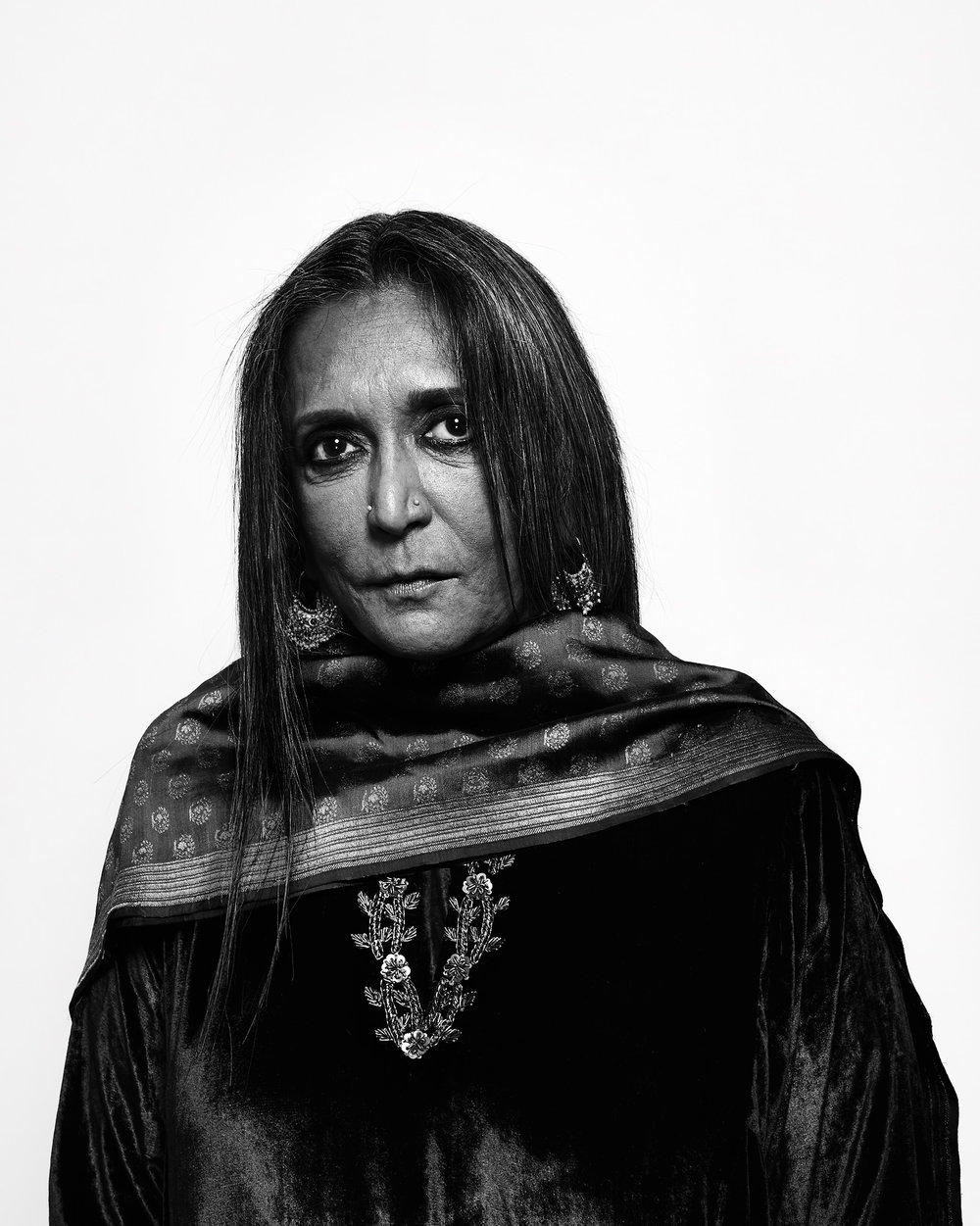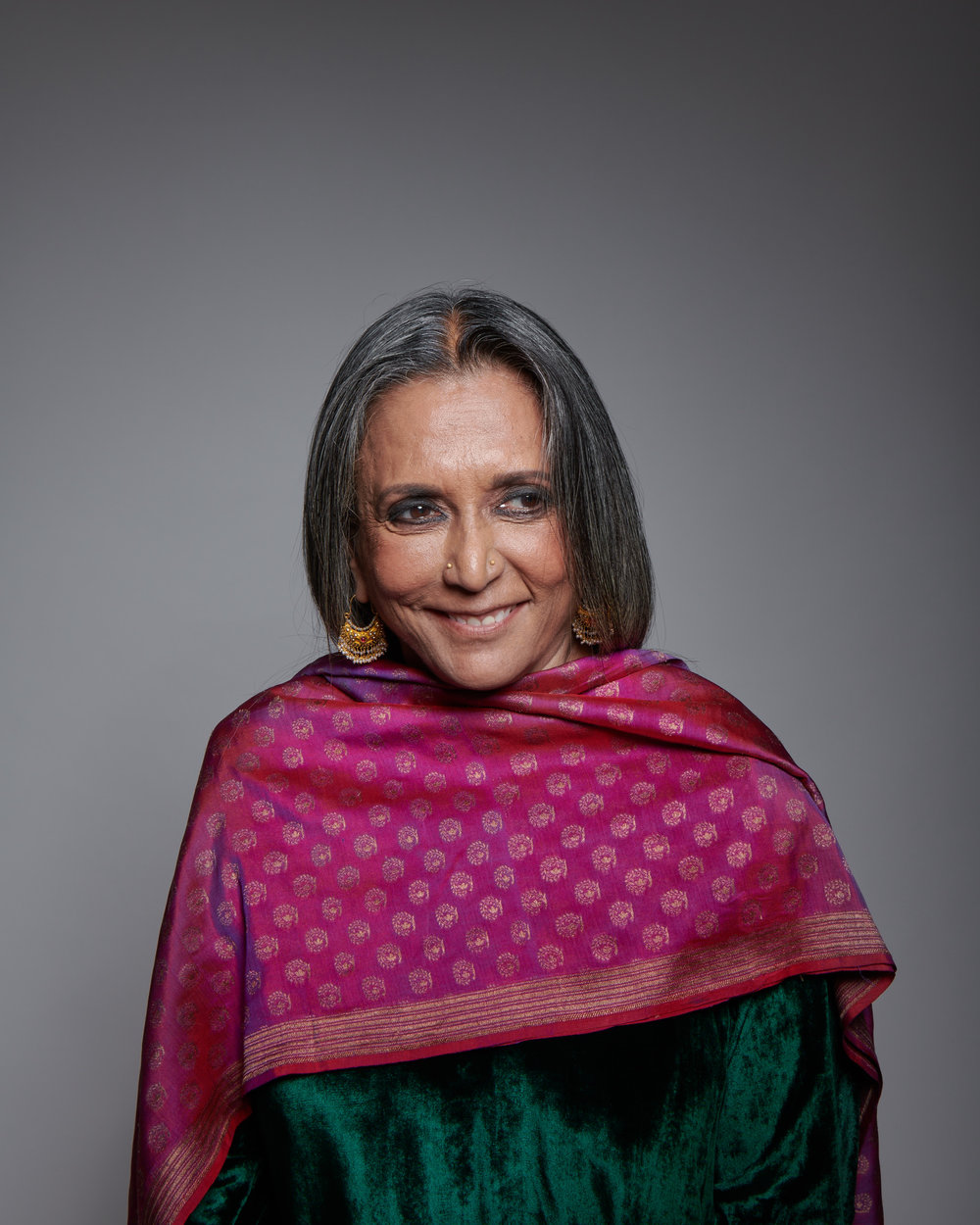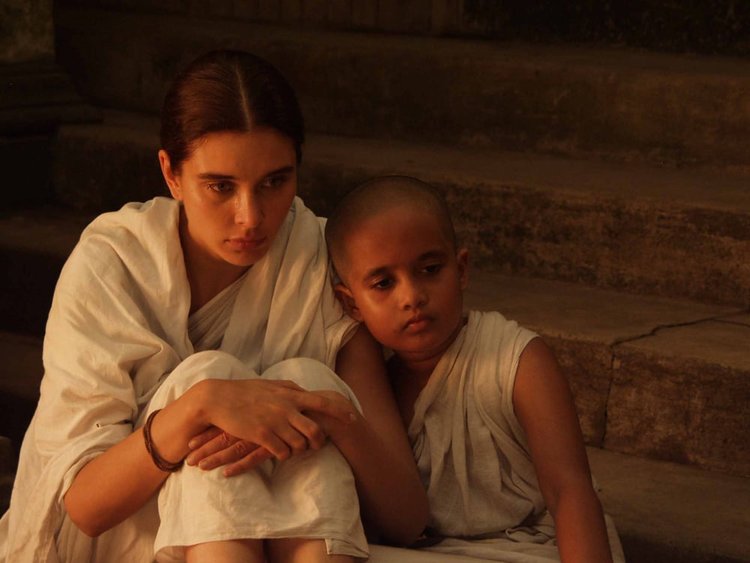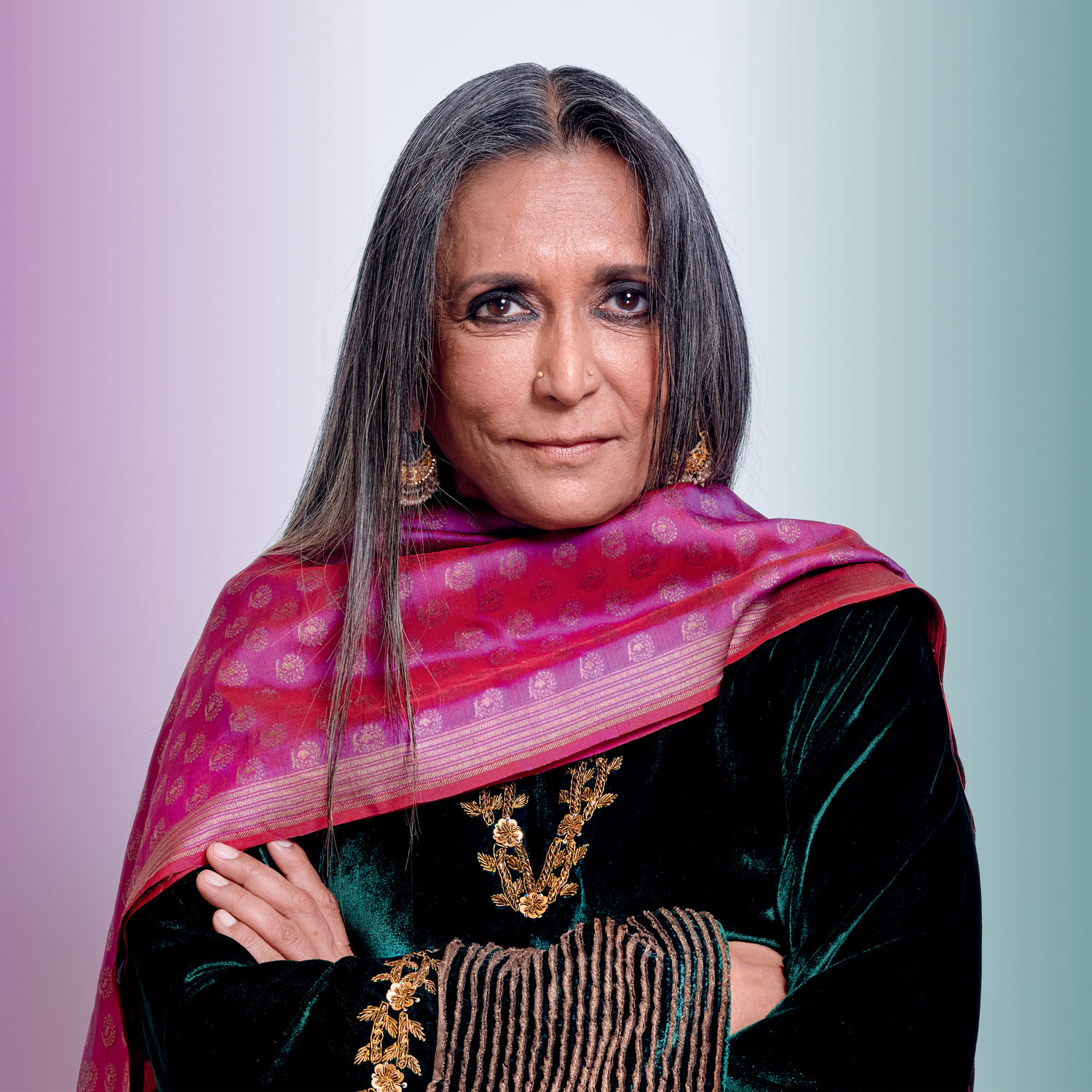THE ACADEMY AWARD-NOMINATED FILMMAKER DIVES DEEP ON FEMINISM, WORLD DIVIDE, AND THE STATE OF THE CANADIAN FILM INDUSTRY.
WRITTEN BY CHRISTINA GONZALES
PHOTOGRAPHY BY JANICK LAURENT
HAIR & MAKE-UP BY TASHINGA CHAUMA
Deepa Mehta just wants to be in her jeans. The Oscar-nominated director and one of the foremost women in Canadian film feels at home during our interview where she can dissect her curiosity. In front of the camera, she’s polite, striking, and receptive, but eager for it to end. Mehta’s used to being on the other side of the viewfinder.
On her own sets, she’s commanding. She runs the show. “I’m really aware that it’s my set,” she says. After all, Mehta grew up in a household with parents who taught her that what she could have – as a girl growing up 1950s India – was virtually limitless.
Her progressive upbringing was a stark contrast to the idea that most girls in India should be subservient to men. From girls being married off as children to ancient customs like sati, where a woman commits suicide as result of her husband’s death – these rituals lingered in the consciousness of the nation, reiterating a narrative that stated women are not independent, they are owned.
As a young child, Mehta was observant. She wondered why her mother was treated with careful respect in her own home, while others were belittled in theirs. Why was dignity a right afforded only to some women? Why was it circumstantial?
The wicked duality of the world revealed itself early on in her childhood — an imprint that would manifest itself into of one of the most celebrated, fearless, and thought-provoking Indo-Canadian filmmakers of the 21st century.
At a time when conversations surrounding women’s rights, immigration, and racial relations has reached a tipping point, Mehta is a resounding artist who, by way of her films, urges viewers to look inward.
Through Fire (1996), Water (2005), and Heaven on Earth (2008), Mehta forces us to face ingrained misogyny. In Earth, an account of a group of friends divided by India’s partition (2017 marks its 70th anniversary), Mehta examines the Pakistani-Indian divide and its resulting wounds with a rawness that no other filmmaker has achieved. The message is clear: Although we’re not one, we still share the same scars.
In her latest movie, Anatomy of Violence (2016), she’s just as forthright: What role does society play in making a rapist? The question forces us to confess our collective sins.
Whether Mehta’s message is inherently political doesn’t matter. “All art is political,” she says.
HOME
Initiating hard conversations comes at a cost. Water, the third movie in Mehta’s elemental trilogy (which includes Fire and Earth) is an agonizing story about institutionalized Hindu widows who are shunned and depraved. It’s told through the eyes of an eight-year-old widowed child. The mere script made Hindu fundamentalists seethe.
Production was halted in the holy city of Varanasi after extremist mobs appeared on the second day of filming: they lit the set aflame, threw its shatters into the Ganges, and accused Mehta of being anti-Hindu for shedding light on subject matter deemed derogatory to Indian women. Those acts were the ones that were inherently political, she maintains.
It was on the flight back to Toronto from India after shutting down Water (the film was eventually completed in Sri Lanka), when she felt a new sense relief – she was finally heading home.
But what does “home” mean?
Mehta arrived in Canada in 1973. Her 1991 directorial debut, Sam and Me, was a thematic depiction of her immigrant experience: The story of a young Indian man who moves to Toronto in the ’90s. He ends up being a caretaker to an old Jewish man who also longs for the idea home. “Does it ever leave us?” she asks. It took her another decade after Sam and Me to realize that she could have two homes.
Closed-border politics makes the idea of “home” a contentious topic in today’s larger social dialogue. Home can mean one’s origins; where they were born and the language they speak. But it can also be a place that provides oneself with their core necessities – clean water, shelter, access to healthcare. Just ask the 46,000 Syrian refugees who entered Canada in 2016. For them, the idea of home isn’t so clear-cut.


“A desire for safety for yourself or your children is so palpable,” Mehta says. Protection and wellbeing satisfy her notion of home. During the 1947 partition of India, 12 million people lost their homes. Displacement is etched into her psyche. It’s what makes people vulnerable, she says, and it takes on many forms, whether it’s a war-induced migration crisis or an arranged marriage.
Of her films, Heaven on Earth is one of her favourites. It’s centred around a Punjabi girl who immigrates to Canada and finds herself victim to domestic violence after she marries a man she’s never met. “You don’t have your mom, you don’t have your sisters, you don’t have your friends, and you’re unfamiliar with the land,” Mehta says.
Strip a woman of her network and she’s defenceless, even in her so-called home.
THE GREAT DIVIDE
Women, first and foremost, are the focus of Mehta’s films – the world through their eyes. The context of her films are Eastern, but try and insinuate that the subject matter only pertains to gender politics in the East and one misses the point. Mehta’s stories are universal.
“You’re talking about eons of teachings and behaviour patterns, which [suggest] that a woman is easy prey and belongs to a man,” Mehta explains. “That’s the inequality.” Gender disparity, she says, isn’t just an Eastern problem. It’s global and far-reaching, affecting women everywhere. The Fox News scandal, Harvard rape case, and, most recently, sexual assault allegations towards Hollywood titan, Harvey Weinstein, are some highly publicized examples.
Less publicized is the way in which women, even in the Western world, carry most of the burden when it comes to household duties. (According to a 2015 Statistics Canada, women spend 50 percent more of their time doing chores at home than men.)
“How do we begin to fix it?” I ask. She bluntly tells me what her family imparted to her on feminism: “No one told me to go to a cooking class.”
Sometimes, it’s not as explicit as getting paid millions of dollars less than your male counterpart in a Hollywood production, a discussion that’s at the forefront of the global film industry, and spearheaded by Hollywood heavyweights like Jennifer Lawrence and Patty Jenkins who, earlier this year, brought in the biggest domestic box-office opening of all time for a female director for Wonder Woman. In Mehta’s films, the female lead gets paid the same as the man. And if there’s no male lead, her lead actress makes significantly more than the other actors.
Sometimes, Mehta says, it’s as simple as raising sons who don’t believe that they’re more privileged, or better at doing certain tasks, solely based on their gender. Breaking deep-seated social norms starts in the home with the stories we tell our children.
Perhaps it’s okay for a daughter to help her dad with lifting wood and nailing the shed, and okay for a son to help cook and serve dinner. Ultimately, Mehta realized early on that every opportunity boys had, she should have too. That included making films.
THE “OTHER”
Through film, Mehta’s able to challenge gender inequality, whether it stems from out-dated traditions or world leaders. Misogyny is normalizing, and it’s because of Trump, she says. The fact that more Caucasian women over the age of 30 voted for Donald Trump over Hillary Clinton still perplexes her.
“How can you respect somebody who talks about ‘grabbing pussies’?” She declares.
Meanwhile, someone as brilliant as Angela Merkel lost 33 percent of votes in Germany’s recent election to the alt-right. “Are we becoming Neo-nazis, all of us?” Mehta reveals herself with questions.
Division among genders, races, sexualities, and countries is at an all-time high. She’s attuned to it.
“Everyone’s feeling angry. Everyone’s been done in. When you look at Indigenous people and you look at their history, it’s a horrific story,” Mehta says. “You look at what happened with slavery in the United States, and what continues to happen to African-Americans, it’s terrible. You think of Holocaust and the Jews, it’s terrible. You think of the partition of India and the colonization of the world by the British, French, and Dutch – half the world was slaves.” She could go on, but halts: “I think all of that history brings us to this point.”
There always has to be an “other.” There always has to be an enemy. We fight, but the scars are all the same – she tried to tell us this with Earth.


Human conflict is cyclical, and they provide Mehta with the base for her work: Currently, she’s knee-deep in a film based on the semi-autobiographical novel Funny Boy, written by Sri Lankan-Canadian author Shyam Selvadurai. It’s set to come out at the end of the 2018.
Arjie is the protagonist, who comes to terms with being a homosexual male against the backdrop of the civil war between the Tamils and Sri Lankans. People around him make fun of his feminine qualities and call him a “funny boy.”
Conflict always starts with the idea that that someone is different or unlike us. Whether “otherness” is a threat to one’s identity is a psychologist’s work. Mehta begs the question: Aren’t we all the same?
LEAVING A LEGACY
There’s a major problem that Mehta has with Canadian film. It’s that Canada calls itself a diverse and multi-cultural country, yet filmmakers aren’t granted access to funds from government bodies unless the movie is made in English, French, or an Aboriginal language.
“If you’ve come from Syria, and you want to make a film on what the experience was like crossing into Turkey, and you want to do it in Arabic, you will not get money,” she explains.
So filmmakers concede and make their movies in English. “The minute you compromise your language, that’s the minute you compromise the content of your film,” Mehta says. “I can’t imagine making Water in English. It would be ridiculous.” The integrity of her films is a non-negotiable.
Cameron Bailey, a colleague of Mehta’s and the creative director of the Toronto International Film Festival (TIFF), agrees that the funding structure for Canadian films needs to change. “[It] was designed decades ago,” he explains. “Before you saw filmmakers like Deepa Mehta making films in India, in Indian languages, or Albert Shin, a Canadian filmmaker making films in Korea, in Korean language, or Lena Rodriguez in Colombia, [making films] in Spanish. This is part of Canadian cinema now.”
Recently, TIFF launched Share Her Journey, a five-year commitment to increase participation and opportunities for Canadian women behind and in front of the camera. Mehta is one of the campaign ambassadors.
“With all of the success [Deepa’s] had and all of the access that she now has as a filmmaker, she’s still really in the trenches,” Bailey says. “She identifies as an independent filmmaker, she’s aware of the barriers that are currently in place for women who are independent filmmakers, and she’s doing everything she can to help.”
Mehta lists off a number of young Canadian filmmakers she admires: Atom Egoyan, Patricia Rozema, Federica Foglia. She tells me about Salar Pashtoonyar, a filmmaker and refugee from Afghanistan who lived in a Pakistani refugee camp with his mother and four sisters before he came to Canada. Pashtoonyar just released his first drama, which was filmed in Pashtu, and shot in a women’s prison in Afghanistan. Is he going to get funding? Likely not. The thought rattles her core.
If she can leave a legacy that allows for young filmmakers, storytellers, and writers to be able to make Canadian films in the language of their own choice, then she’ll be satisfied, she tells me. Until then, the work doesn’t stop.




From left: Water (2005), Fire (1996), Earth (1998), Midnight’s Children (2012), Heaven on Earth (2008), Beeba Boys (2005), Anatomy of Violence (2016)
***
The photographer is asking Mehta to move around her churidar kameez, an Indian garb. “Can we try a few shots without it?” He asks. “No,” she answers. “It’s traditional.” She’s not rude, nor bothered, only sure.
When I ask her who she surrounds herself with, she tells me that like most artists, she’s a loner by nature. Surely there’s some glitz she can share about filmmaking, so I push further: “Did being nominated for an Academy Award change things for you?” She shrugs. The look on her face is indifference.
It’s not like she’s ungrateful for the recognition and for the opportunities, she says. “It was wonderful, it was lovely, but it doesn’t change.” She confirms. The benchmark for Mehta’s projects have always been what moves her.
And what moves her and peaks her curiosity are stories that are from home, with themes that are universal. Stories that nudge viewers to be more introspective: the struggles and tenacity of women, the pain caused by divide, the war against the other.
When she looks at the shots of her portraits in the viewfinder, Mehta knows what she likes. The photographer succumbs to her. Mehta’s decisive. She runs the show.








